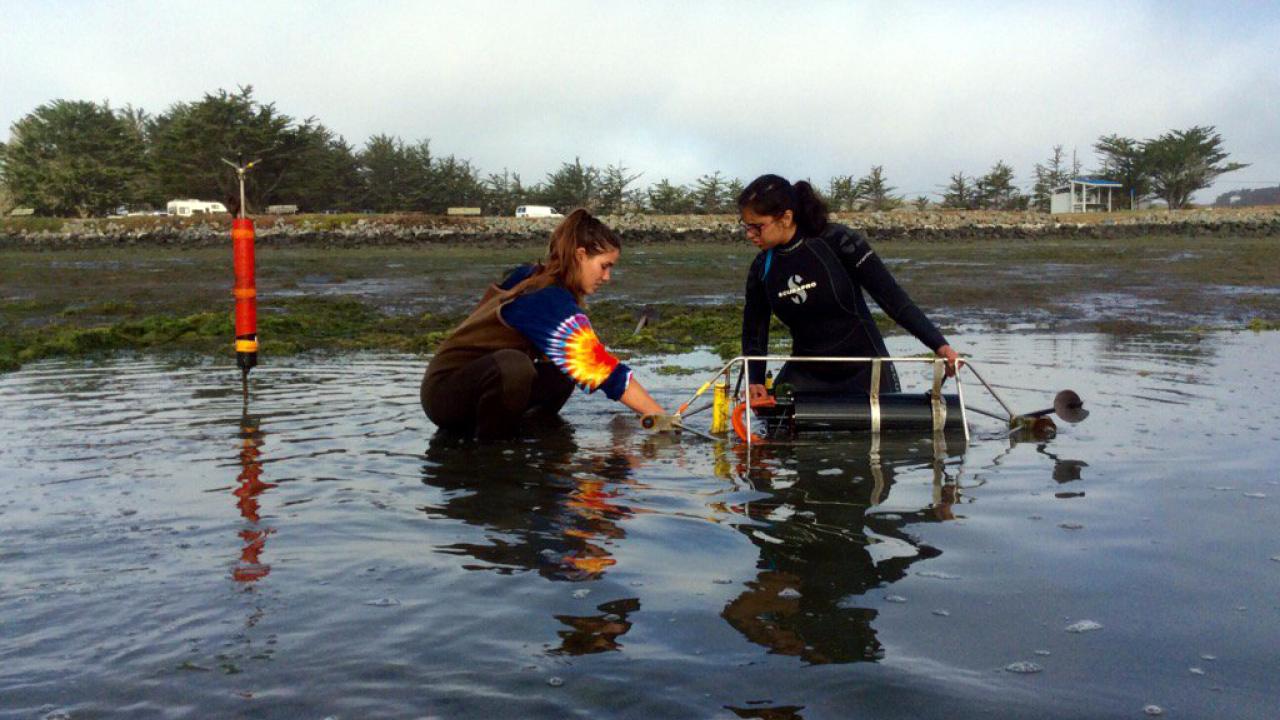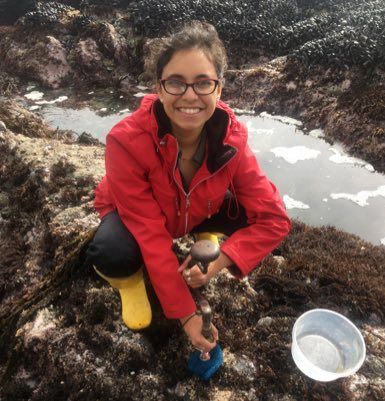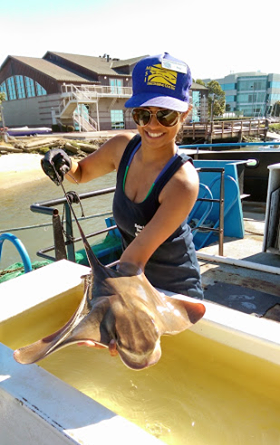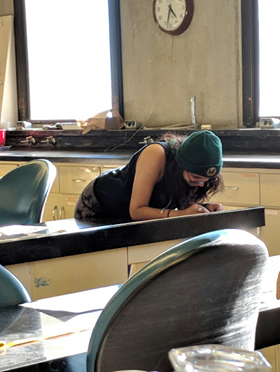
Demystifying Undergraduate Research Experiences
For many undergraduate students interested in pursuing marine science as a career, getting research experience (even if its research units required for your degree) is a necessary, and sometimes intimidating, process.
Below, CMSI's 2020-21 Lead Mentor Priya Shukla shares some of her thoughts on finding and learning from her undergraduate research experiences.
How did you get into doing research?
After years of learning about scientific discoveries in grade school, I was craving my own ah-hah! Moment. Like many of you, I did my undergraduate degree (in Environmental Science & Management) at UC Davis, and there was a high volume of research happening on campus. So, opportunities abounded for me to get some experience - I just needed to know where to dig in. Because I wanted to earn some extra income*, I prioritized paid research assistant positions over volunteer work and unpaid internships. I went onto have several positions that taught me what I didn’t want to do, before I realized what sort of work not only helped me pay the bills, but piqued my curiosity even while doing the most mundane tasks.
 My first job on campus involved doing air quality research. I then worked at greenhouses located in west campus and an agricultural pest lab in the basement of Briggs Hall. In my last two years of undergrad, I worked in a fish conservation and at a paleoceanography lab (Tessa Hill’s lab) out at the Bodega Marine Lab.
My first job on campus involved doing air quality research. I then worked at greenhouses located in west campus and an agricultural pest lab in the basement of Briggs Hall. In my last two years of undergrad, I worked in a fish conservation and at a paleoceanography lab (Tessa Hill’s lab) out at the Bodega Marine Lab.
Each of these jobs taught me what sort of tasks I did and didn’t enjoy doing, but it was through the later two jobs that I learned how much I loved doing work on, in, near, about water and climate change -- specifically the ocean!
* I mentioned that I only accepted positions that would pay me, but there are several different ways to do research: you can get paid like I did, get compensated in the form of research units (many science majors at UC Davis require research credits to graduate), or you can volunteer your free time. If you’re interested in a research position that doesn’t necessarily come with a salary or stipend, you should talk with your research mentor about ways to apply for funding (e.g., work-study).
What is your favorite thing about doing research?
Like many people, I love that doing research - especially fieldwork - means I get to work in some breathtaking places! But, my favorite thing about doing research is the part that many people dread - writing it all up! There is so much that goes into a given project - brainstorming, finding funding, setting up an experiment, watching it fail and re-doing the work, interpreting unexpected results, and then passing it along to fellow scientists for their perspective on your work (peer review) before you share it with your colleagues.
Don’t get me wrong - putting all of these pieces together is really challenging and fun! But, writing publications (along with presenting at conferences) is also the part of the process that helps science get out of the lab and into the world. Getting your work peer-reviewed and published is a lengthy process, but it also is what allows “sound science” to be used to make decisions. And, there’s something thrilling about seeing your name as an author!
Is there anything about doing research that you don’t like?
My least favorite thing about doing research is also one of the things that makes it really fun - early morning low tides. Low tides are beautiful and epic opportunities to see the diversity of life and interesting ecological interactions that occur in the zone where the water rises and falls every day. These low tides start at convenient times at the beginning of summer, but get progressively earlier as summer edges into fall. This means getting up at 4:00am (which is hard, but not the part I don’t like) and having to be extremely careful so that I don’t make silly mistakes in my sleep-deprived state and up feeling scornful towards my past self. 
For example, one of my field sites has much softer mud than the other, so I can wear some standard rainy day galoshes at one, while the other requires full on wader so that I can maneuver around in the mud. During one of my first excursions, when I was still getting comfortable at the mushier site, I forgot to put on my waders. I tromped out to my experimental baskets - or at least I tried to - in the rainboots. I had maybe taken 10 steps before my left foot sank into the mud up to the middle of my calf. I went to take another step, and my foot slipped out and I managed to catch myself before my socked foot hit the mud. I ground down with my right foot to maintain my balance and then hoved my left foot back into its boot. To make my way out of the situation, I had to pull on the lip of both boots as I took each step to prevent that from happening again. I managed to make it back to my car and change into my waders … but then managed to make the same mistake at least once more before I fully learned my lesson!
What surprised you about doing research?
I had romanticized the ah-hah! moment I was seeking! There is so much failure before you get to that point. That sometimes means you end up literally shedding blood (because you banged your knuckles against the water table), sweat (because lifting multiple buckets of water is exhausting), and tears (because sometimes no matter how much you try to get things right, nature is complicated and the species you’re working with don’t cooperate). You are asking questions and doing work that no one else has - so of course you’re going to make mistakes!
 Over time, I’ve gotten better at accepting failure, but it still bums me out when things don’t work. But, because I’m the kind of person who loves planning, I build failure into my plans. That way, when things don’t work out, I can pretend it was part of the plan all along (because it was!). Also, because there is so much failure between conceiving an idea and writing it up (because something breaks, your data don’t tell a clear story, your code won’t run, your figures don’t make sense), it is really satisfying when things begin to fall into place, and it becomes clear what your data are telling you; that ah-hah! moment is truly rewarding!
Over time, I’ve gotten better at accepting failure, but it still bums me out when things don’t work. But, because I’m the kind of person who loves planning, I build failure into my plans. That way, when things don’t work out, I can pretend it was part of the plan all along (because it was!). Also, because there is so much failure between conceiving an idea and writing it up (because something breaks, your data don’t tell a clear story, your code won’t run, your figures don’t make sense), it is really satisfying when things begin to fall into place, and it becomes clear what your data are telling you; that ah-hah! moment is truly rewarding!
Is getting research experience worth it if you don’t want to do it for a living?
Absolutely - because it is an invaluable opportunity to push yourself out of your comfort zone while learning new skills. Yes, you might learn niche skills like counting otolith rings or measuring seawater carbonate chemistry, but you’ll also learn time management and organization skills, what working collaboratively looks like, and gain more abstract qualities like patience and perseverance -- all of which have application beyond marine science research.
How can you find research experiences?
Through the job application system (currently Handshake) and departmental emails, I found and heard about several research opportunities to work directly with graduate students, post-docs and professors. I applied to dozens of these and would hear back from ~ 20% of the people I reached out to and positions I applied for. For opportunities associated with UC Davis, you can also check out this Research Opportunities Database.
Resources for Finding Research Opportunities
Handshake - UC Davis job application system
Research Opportunities Database - UC Davis opportunities only
Also, if you are concerned that you won’t be competitive because you don’t have any prior research experience - you should recognize skills you’ve gained in other positions you’ve held! For example, working at a restaurant, you have to be adaptive and juggle multiple tasks at once on a strict schedule. Babysitting requires you to be extremely responsible and careful. Being an athlete means that you have grit and know how to strategize, follow complex plans, and achieve goals.
Bear in mind that you likely won’t be starting out planning your own experiments. You’ll probably be working with someone who needs help setting up and carrying out an experiment or has completed one and is inundated with samples to process. Learning these different components makes the whole process more accessible.
If you have any questions about research that were not answered here, consider submitting them to the new Ask A Grad Student Blog!
